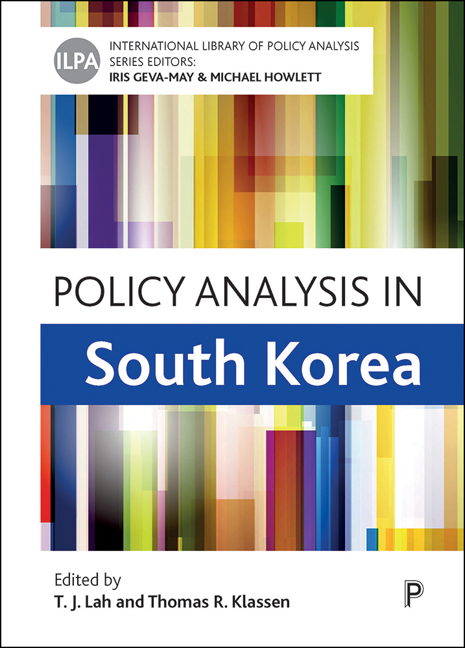Book contents
- Frontmatter
- Dedication
- Contents
- List of figures, tables and boxes
- List of abbreviations
- Notes on contributors
- Acknowledgements
- Editors’ introduction to the series
- Foreword
- Part One Overview of policy analysis in Korea
- Part Two Policy analysis by governments
- Part Three Committees, consultants, media, public inquiries and public opinion
- Part Four Parties, interest groups and advocacy-based policy analysis
- Part Five Academia, research institutes and policy analysis
- Index
ten - Public concerns and public inquiry in Korea
Published online by Cambridge University Press: 18 January 2024
- Frontmatter
- Dedication
- Contents
- List of figures, tables and boxes
- List of abbreviations
- Notes on contributors
- Acknowledgements
- Editors’ introduction to the series
- Foreword
- Part One Overview of policy analysis in Korea
- Part Two Policy analysis by governments
- Part Three Committees, consultants, media, public inquiries and public opinion
- Part Four Parties, interest groups and advocacy-based policy analysis
- Part Five Academia, research institutes and policy analysis
- Index
Summary
Introduction
The practice of public inquiry has been actively adopted in the UK and Westminster states to investigate a specific incident of public interest or concern (Howe, 1999; Elliott and McGuinness, 2002; Sulitzean-Kenan, 2006). Opinions on public inquiry are divided. On the one hand, public inquiry is a ‘panacea’ for reviewing incidents and providing solutions that prevent similar incidents from occurring in the future (Elliott and McGuinness, 2002). On the other hand, public inquiry is a ‘placebo’ in that it gives the public the feeling that incidents are being investigated when in fact, no progress is made in many cases and the investigation peters out as the public loses interest (Elliott and McGuinness, 2002). Nevertheless, the UK and other Westminster states make good use of public inquiries to investigate incidents, and if public inquiry is a placebo, the blame for this lies not in public inquiry itself but in those who implement the investigations.
In Korea, public inquiry is very much understudied. One reason may be that there are only a few cases of public inquiry. The first was conducted in 2000 to investigate suspicious deaths during the military dictatorship. Since then, only seven more public inquiries have been launched. This lies in contrast to the UK, where 68 cases were investigated between 1990 and 2017 (Norris and Shepheard, 2017).
This chapter provides an overview of the Korean committee system and evaluates the public inquiry system by examining all public inquiries carried out to date. Korea has adopted a presidential system of government with three types of committee; administrative committees, advisory committees and independent regulatory committees. All public inquiries are established in the administrative committee format, but unlike in the UK, where the chair of a public inquiry is an incumbent or former judge, some public inquiries in Korea have been chaired by government officials or civilians (including former judges). Korean public inquiries also have a theme of righting historical wrongs, and most of the public inquiries to date investigated incidents that occurred before democratisation, mostly during the military dictatorship era.
As one of the first studies on Korean public inquiry, it is hoped that this chapter will provide useful academic and practical information about this subject.
- Type
- Chapter
- Information
- Policy Analysis in South Korea , pp. 137 - 152Publisher: Bristol University PressPrint publication year: 2023



